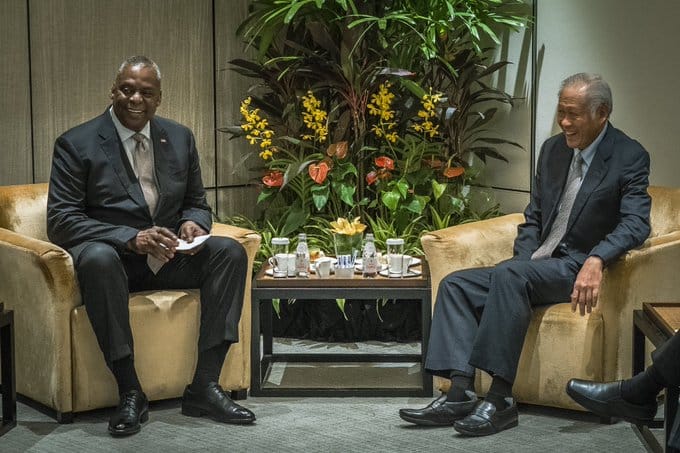Defense Secretary Lloyd Austin was in Singapore Friday at the start of the Shangri-La Dialogue, where he would spend the weekend in meetings, discussions and backroom deals with many of his global counterparts.
Austin had hoped to speak with China’s Minister of National Defense on the sidelines of the summit, but Li Shangfu declined his invitation earlier this week.
Austin met with Li’s predecessor on the sidelines of last year’s summit, but the Defense Secretary has not spoken with his current Chinese counterpart since Li became Defense Minister in March.
Both Austin and Li are expected to trade barbs in speeches over the weekend, after Australian Prime Minister Anthony Albanese delivers the keynote address Friday evening.
Already heightened U.S.-Chinese tensions were made worse in recent months after the Pentagon in February shot down what it says was a Chinese surveillance balloon over South Carolinian waters after it had crossed the continental U.S.
On February 7, China refused to take a call from Secretary Austin, which had been meant to ratchet down those tensions. China had stated the U.S. had not created “the proper atmosphere for dialogue” at this time.
Tensions have been further aggravated by China’s saber-rattling against its self-governing neighbor, Taiwan. The U.S. has suspected for some time that China is planning to invade Taiwan, though it has been watching and waiting to see how Russia fairs in its invasion of Ukraine before going forth with an assault against the island nation, just one hundred miles off China’s coast.
In mid-May White House National Security Adviser Jake Sullivan held unpublicized talks with senior Chinese Foreign Policy Adviser Wang Yi in Vienna, during which he told Wang that the U.S. was “looking to move beyond” the spy balloon-sparked tensions.
According to China’s Xinhua News Agency, Beijing officials at the time saw the discussions as “substantive” and said both sides would “continue to make good use of this channel of strategic communication.”
But the summit in Singapore may potentially grate tensions. The United States is Australia’s biggest security ally, and Beijing has criticized a $250 billion deal announced in March for Australia to buy U.S. nuclear-powered submarines.
However, there has already been one brief moment of Chinese and American dialogue during a sideline session on cybersecurity at the summit.
U.S. Director of National Intelligence Avril Haines said “we should be talking to China” in answer to a question from Chinese Senior Colonel Zhu Qichao about collaborating on cybersecurity risks associated with artificial intelligence.
Earlier this week Austin said that he would continue to reach out to Li, despite this week’s rebuff. “I think that’s critical,” the Defense Secretary said.


